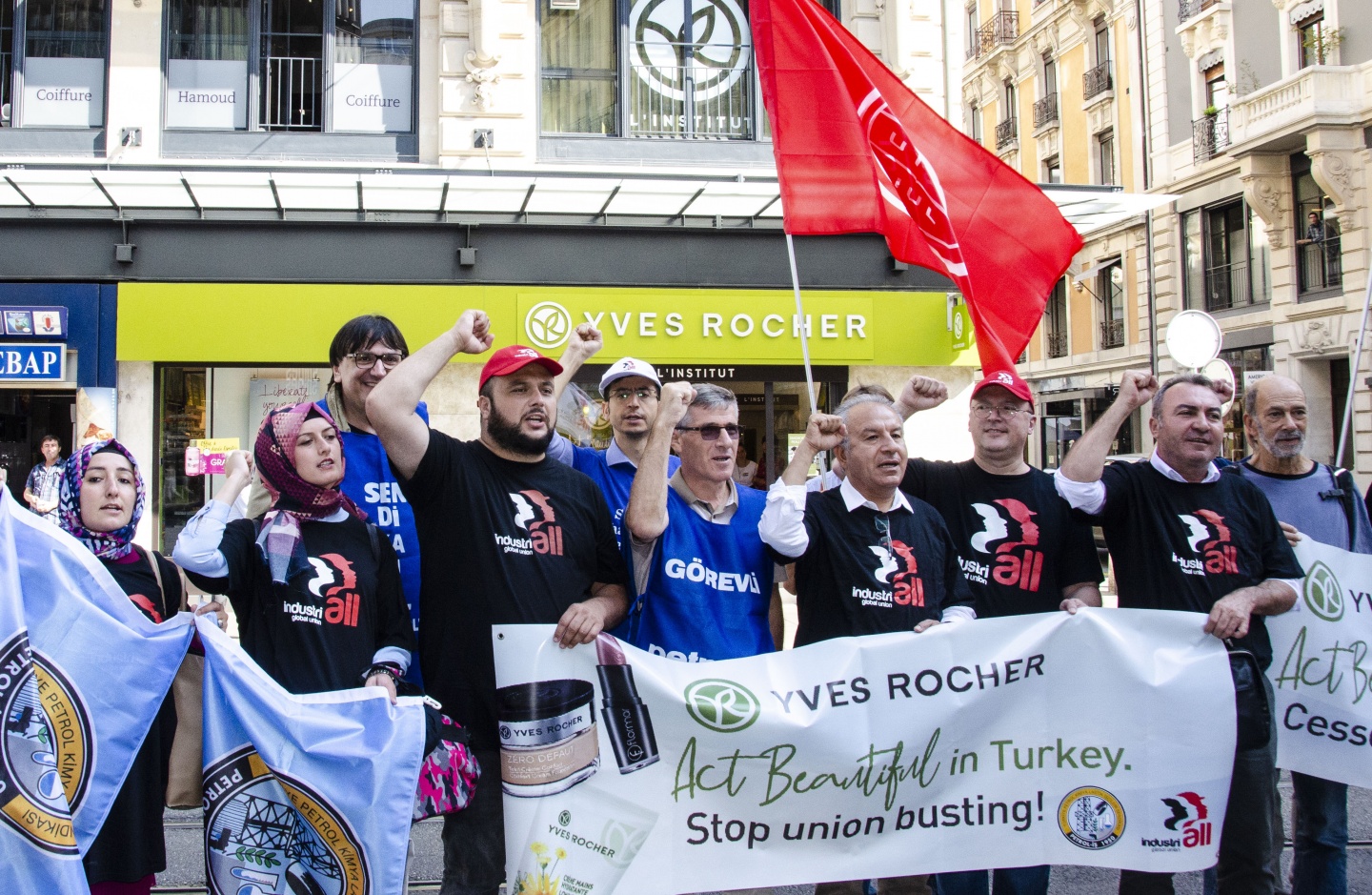IndustriALL Global Union’s Charter of Solidarity in Confronting Corporate Violations of Fundamental Rights
IndustriALL is a global trade union representing more than 50 million manufacturing, energy and mine workers in some 140 countries. We are committed to defending and furthering the rights of workers all over the world and engage in a wide array of activities in pursuit of that goal.
IndustriALL’s Action Plan adopted at its Founding Congress gives a mandate to:
- Take responsibility for the respect of union rights and decent working conditions throughout their supply chains
- Develop further a MNC network strategy for exchange of information, joint initiatives,common platforms, coordination of national collective bargaining and mobilization in case of violations of workers’ rights by MNCs and their suppliers
- Establish mechanisms of regular social dialogue at global and/or regional level to enable constructive industrial relations leading to global level negotiations
- Build up the necessary organizational procedures to enable the conclusion of agreements beyond GFAs with MNCs
One of our key areas of focus is multinational companies (MNCs), and IndustriALL Global Union represents millions of workers in thousands of MNCs. Multinational companies also account for around 70% of world trade, and are without doubt critical in defining and shaping the global economy in which we live and operate today.
Given their power and influence it is essential that MNCs operate in a manner that respects and promotes human rights, including workers’ rights wherever they are present, in particular in relation to the Core Labour Standards as defined by the United Nations’ International Labour Organisation (ILO), namely;
- The right to organise and belong to a trade union – ILO Convention 87;
- The right to bargain collectively – ILO Convention 98;
- A commitment not to use Forced or Bonded Labour - ILO Conventions 29 and 105; A commitment not to use Child Labour – ILO Conventions 138 and 182;
- A commitment to non-discrimination – ILO Conventions 100 and 111.
Furthermore , with the adoption of the UN’s Guiding Principles on Business and Human Rights, and the reference to them in the OECD’s Guidelines for Multinational Enterprises, there is now less of a distinction between the ILO’s Core Labour Standards and all of its other standards , including the ILO’s important occupational health and safety instruments (eg. ILO Convention 155, the Occupational Safety and Health Convention; or ILO Convention 176, the Convention on Safety and Health in Mines; among others). IndustriALL Global Union expects MNCs to act affirmatively to uphold all human rights standards, including all of the instruments and standards of the ILO, and not just the core labour standards.
Under these new Principles and Guidelines, MNCs are responsible for avoiding adverse impacts and must exercise due diligence in ensuring this through their value chains and business relationships, and within their spheres of influence.
Although some MNCs abide by these standards and have even signed Global Framework Agreements (GFAs) with IndustriALL Global Union to give credence to their commitments, there are still companies that have not and that adamantly refuse to do so. More worryingly still, there are
also companies that have signed such agreements and then do not abide by the commitments they have given. In some cases these companies do recognise unions and behave with respect towards the workforces in the countries from which they originate, and then behave in an anti-union and abusive manner towards workers in other countries where they are present.
IndustriALL Global Union entirely rejects the notion that companies may behave properly where they are headquartered and then refuse to adhere to the same standards elsewhere. Furthermore, IndustriALL Global Union utterly rejects the idea that companies that are parties to GFAs having given commitments to observe and abide by Core Labour Standards, but then totally ignore those commitments when they deem it expedient to do so, whether under the pretext of adhering to national laws or for any other reason.
- To this end IndustriALL Global Union and its affiliates have committed to taking the following actions when the Secretariat receives notification from an affiliate that an MNC in its country is violating human and Core Labour Standards:
- Upon being notified of an MNC infringing human and Core Labour Standards, IndustriALL Global Union secretariat will contact the union in the country where the MNC is headquartered, if one exists, to solve the problem.
- IndustriALL Global Union will, where appropriate, seek to arrange a meeting with the central management of the infringing MNC urging it to solve the issue. IndustriALL Global Union will inform and involve the relevant affected union(s), the union(s) representing workers in the country where the MNC is headquartered, and other relevant affiliates;
- Should the MNC not agree to take immediate steps to rectify the problem, IndustriALL Global Union will notify all affiliates and coordinate a series of actions to bring about pressure for the MNC to amend its actions. These measures may include:
A meeting of affiliates with members in the company concerned to produce a detailed overview of the situation;
Media actions to notify the widest possible public of the infringements of workers’ rights – both in the country in which the offending MNC is headquartered as well as the countries in which it operates;
An examination of the possibility of industrial action and demonstrations in support of the affected workers and their union;
Appropriate legal actions before ILO bodies, the OECD, regional human rights bodies and forums established under trade agreements.
The production of a detailed leverage strategy designed to rectify the situation;
At all times affiliated unions will seek to ensure that member activists and representatives are fully involved and take ownership of the action plans being developed. Strategies that put members and their representatives at the heart of the activities will be considerably more effective in achieving the desired outcomes.
